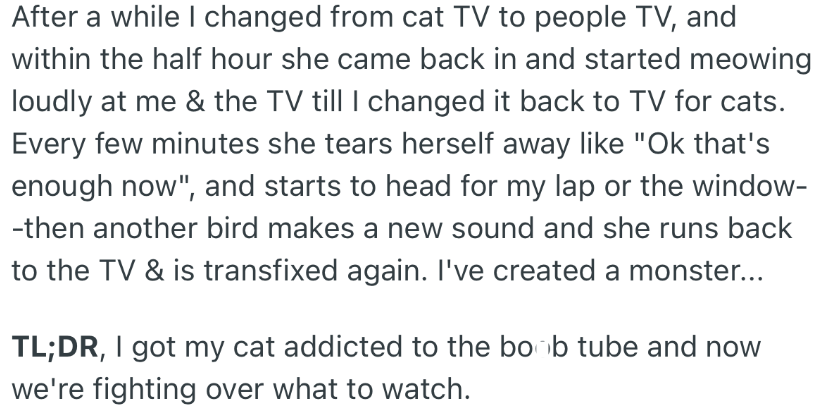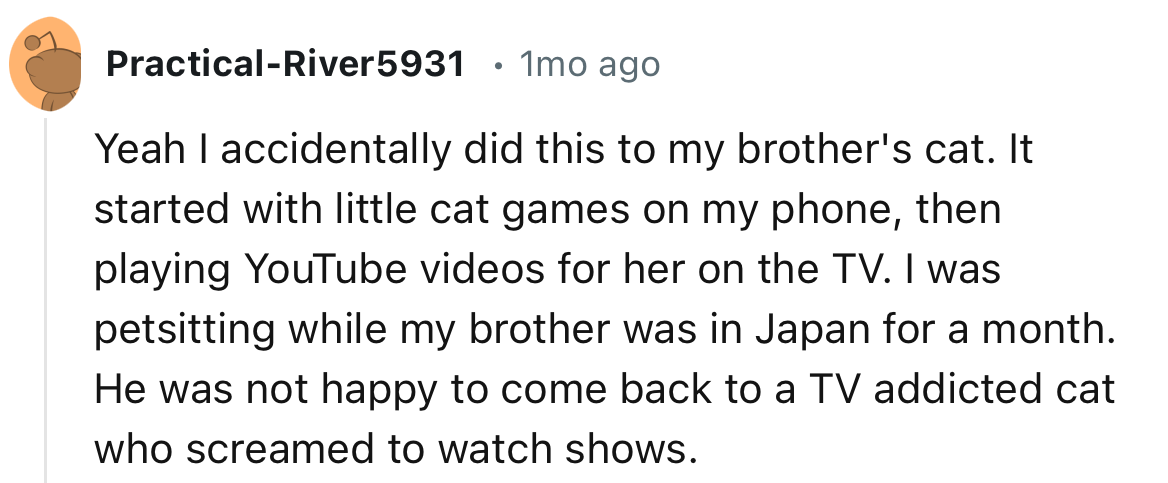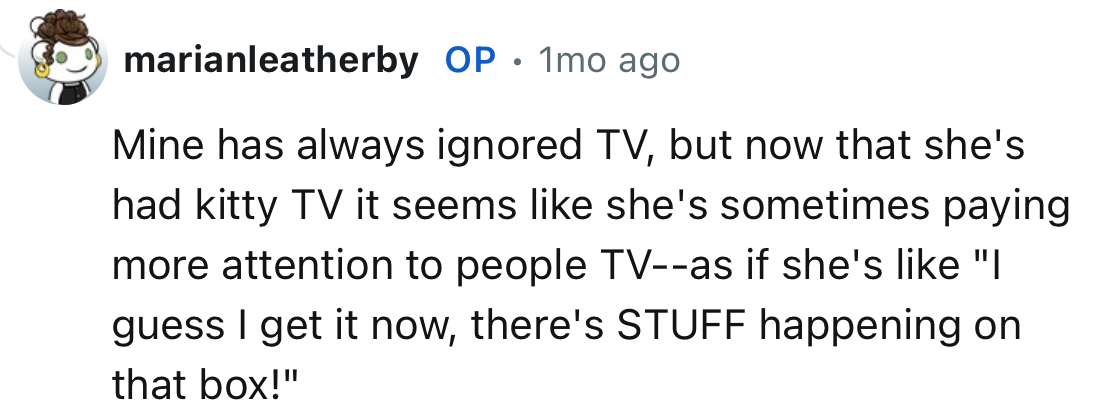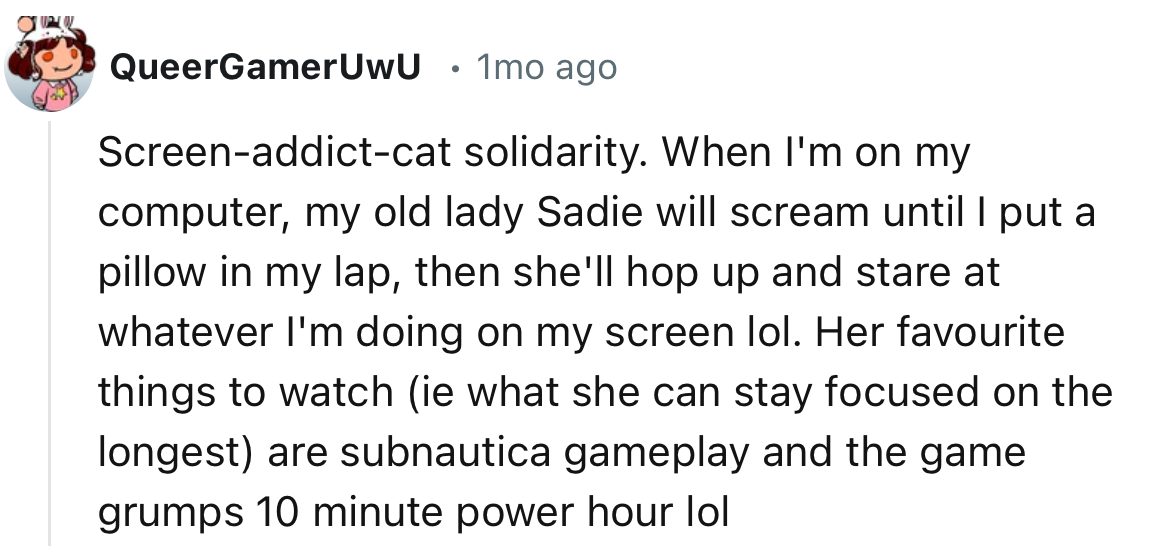Cat Parent Introduces Their Furball To Cat TV, Now She’s Completely Obsessed And Has Lost Desire To Do Anything Else
Finding the perfect gift for your pet can feel like winning the lottery. In our narrator’s (Original Poster’s) case, they hit the jackpot when they discovered cat TV.
OP’s cat, who usually turned her nose up at the latest trendy toys and plush beds, was instantly captivated. Finally, something that didn't end up as a forgotten relic under the couch!
OP was thrilled to see her so engaged. Her eyes remained glued to the screen as birds flitted and chirped, and other tantalizing creatures danced across the display. But, oh, how quickly the tables turned.
Their little bundle of fur became addicted—hook, line, and sinker. OP had unleashed a feline monster with an insatiable appetite for her new favorite show!
After a good binge-watching session, OP thought it was time for some human TV—big mistake. Not even half an hour passed before she was back, meowing her protest loud and clear.
Her message was unmistakable: switch back to cat TV, or else—it was a threat no human could refuse. Every few minutes, she would pretend to lose interest and wander toward their lap or the window; yet, without fail, a new bird call would reel her back in.
It was like watching a tiny furry addict with the world's shortest attention span and the biggest enthusiasm. Would OP ever get to watch human TV again? It was a slim chance.
The story in detail

OP tried several methods to get her cat’s attention and eventually found a way to keep her happy. Unfortunately, her cat has become addicted to it.

Understanding Behavioral Addiction in Pets
The phenomenon of pets becoming fixated on screens, known as 'cat TV,' highlights a form of behavioral addiction that can be observed in both animals and humans.
Research indicates that animals can develop compulsive behaviors just like humans, often as a response to environmental stressors or lack of stimulation.
According to studies by animal behaviorists, this can lead to a decline in physical activity and social interaction, resulting in detrimental effects on their overall well-being.
OP realized that tuning the TV to cat stations kept her cat happy. However, she noticed that when she changed the channel, her cat would seek attention until the channel was changed.

Check out some interesting comments below:

From a psychological perspective, engagement with screens can provide a form of escapism for pets, akin to how humans use media to cope with stress.
Behavioral psychologists have noted that this fixation can stem from boredom or anxiety, which often manifests in compulsive behaviors.
To mitigate these issues, pet owners should ensure a balanced routine that includes interactive play and mental stimulation.
There is an iPad generation of cats now.

I accidentally did this to my brother's cat. It started with little cat games on my phone, then playing YouTube videos for her on the TV.

The Psychological Impact of Screen Time on Pets
Studies have shown that excessive screen time can alter the brain's reward pathways, similar to substance addiction in humans.
This can lead to a significant decrease in a pet's natural behaviors and instincts, which is concerning for their emotional health.
Veterinarians suggest that incorporating physical activities and social interactions is crucial to counteract the effects of screen addiction.
He'll sit there and paw at my show until I give up and let him watch cat TV.

When my cat is in the mood, she will literally watch anything on TV. She seems to like Friends, actually.

It's important to recognize that while some screen time can be beneficial, moderation is key.
Animal psychologists recommend setting limits on screen exposure while introducing enriching activities that stimulate both the mind and body.
Engaging in playtime with toys or interactive games can help redirect a pet's focus away from screens and back to natural behaviors.
Mine has always ignored TV, but now that she's had kitty TV, it seems like she's sometimes paying more attention to people TV.

When I'm on my computer, my old lady Sadie will scream until I put a pillow in my lap; then she'll hop up and stare at whatever I'm doing on my screen, lol.

Redditors chimed in with their own cat TV tales that spelled adorable in every language. One user shared how they ended up donating an old tablet to their cat, who now lounges with a blanket, watching videos solo.
Another suggested getting a cheap second TV just for feline entertainment. One thing everyone could agree on was that introducing cats to TV was a slippery slope.
Spoiling pets? Absolutely. But seeing the joy it brings makes it all worth it.
What do you think about this story? Let us know in the comments.
My father-in-law’s parrot loves to watch cartoons but is a very discerning viewer.

She also loves it when I’m watching Italian-language shows and Nordic noir.

Recommendations for Healthy Pet Engagement
To ensure a well-rounded lifestyle for pets, owners can implement a structured schedule that includes dedicated playtime, training, and exploration.
Research supports the idea that pets thrive on routine, which can help reduce anxiety and compulsive behaviors.
Additionally, introducing puzzles or treat-dispensing toys can provide mental challenges that keep pets engaged without relying on screens.
Psychological Analysis
This situation illustrates how pets can develop behavioral patterns that parallel human addictions, particularly in response to environmental factors.
It's important for pet owners to recognize these signs early and to intervene with positive behavioral strategies that promote healthier habits.
Analysis generated by AI
Analysis & Alternative Approaches
Overall, managing a pet's screen time is crucial to maintaining their physical and emotional health.
Veterinary behaviorists emphasize that with appropriate engagement strategies, pets can lead happier, healthier lives, avoiding the pitfalls of behavioral addiction.
Ultimately, pet owners play a pivotal role in fostering a balanced environment that promotes well-being.



